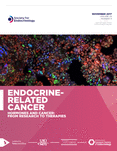Killing the second messenger: targeting loss of cell cycle control in endocrine-resistant breast cancer
- Departments of Medicine and Pharmacology, Masonic Cancer Center, University of Minnesota, 420 Delaware Street South East, MMC 806, Minneapolis Minnesota 55455, USA
- (Correspondence should be addressed to C A Lange; Email: lange047{at}umn.edu)
Abstract
The majority (∼70%) of breast cancers are steroid hormone receptor (SR) positive at the time of diagnosis. Endocrine therapies that target estrogen receptor α (ERα) action (tamoxifen, toremifene, fulvestrant) or estrogen synthesis (aromatase inhibitors: letrozole, anastrozole, exemestane; or ovarian suppression) are a clinical mainstay. However, up to 50% of SR+ breast cancers exhibit de novo or acquired resistance to these clinical interventions. Mechanisms of resistance to endocrine therapies often include upregulation and/or activation of signal transduction pathways that input to cell cycle regulation. Cyclin D1, the regulatory subunit of cyclin-dependent protein kinases four and six (CDK4/6) serves as a convergence point for multiple signaling pathways. In a recent paper entitled ‘Therapeutically Activating Retinoblastoma (RB): Reestablishing Cell Cycle Control in Endocrine Therapy-Resistant Breast Cancer’, Thangavel et al. reported maintenance of cyclin D1 expression and RB phosphorylation in the face of ER ablation in multiple breast cancer cell line models of endocrine resistance. RB-dysfunction defined a unique gene signature that was associated with luminal B-type breast cancer and predictive of poor response to endocrine therapies. Notably, a new CDK4/6 inhibitor (PD-0332991) was capable of inducing growth arrest by a mechanism that was most consistent with cellular senescence. In this review, these findings are discussed in the context of SRs as important mediators of cell cycle progression, and the frequent loss of cell cycle checkpoint control that typifies breast cancer progression. These studies provide renewed hope of effectively stabilizing endocrine-resistant breast cancers using available complementary (to endocrine-based therapies) cytostatic agents in the form of CDK4/6 inhibitors.
- Revision received 24 April 2011
- Accepted 25 May 2011
- © 2011 Society for Endocrinology












